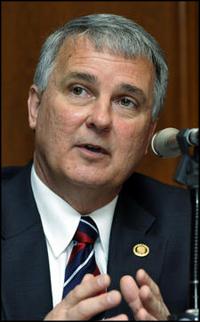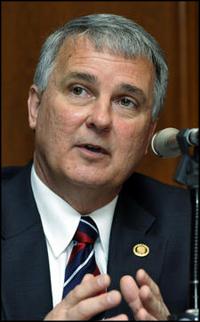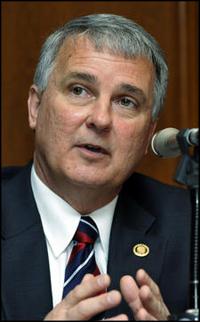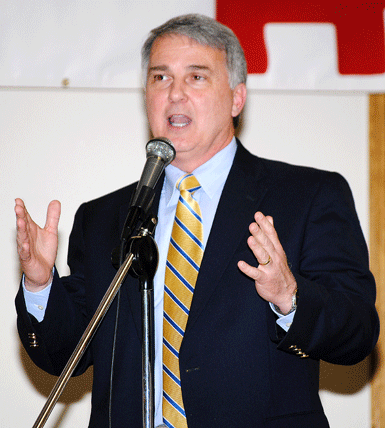
By Rob Mayer
More than 1,600 bills and joint resolutions were filed during the 2012 legislative session. Of those, 114 measures were passed by the General Assembly and have been sent to the governor, many of which still await his executive action. This past session, I sponsored and co-sponsored some of the measures that now lay on the governor's desk for his approval.
Legislation that requires certain funds received by sheriffs to be placed in a special fund in the county treasury is among those bills waiting the governor's stamp of approval. Currently, there is a special fund in each county treasury for certain funds coming into the possession of sheriffs that is to be used for each sheriff's office. However, land sale proceeds and regular budget allocations are not to be directed into the fund. In addition, the fund may not exceed $50,000. Any proceeds in excess of this amount go into the county treasury's general revenue fund. Senate Bill 834, which is contained in a larger judiciary measure (SB 628), specifies that charges received by sheriffs for executing service of process or other court orders must be placed in the special fund, subject to the $50,000 cap.
I also signed on to co-sponsor SB 812, a bill that establishes the Missouri Electric Prior Authorization Committee and pilot program. Substantially similar to HB 1827, which has been delivered to the governor for his signature, SB 812 creates a committee to facilitate, monitor and report to the General Assembly on Missouri-based efforts to contribute to the establishment of national electric prior authorization standards, which relates to the process of obtaining prior approval from an insurer for certain services or medications. Through a pilot program, the committee would study and disseminate information from the National Council on Prescription Drug Programs and advise the Legislature and the Department of Insurance, Financial Institutions and Professional Registration regarding the need for administrative rules for the department to advocate.
Finally, Senate Bill 754 designates a portion of Missouri Route 25 in Stoddard County as the "Spec. James Burnett, Jr. Memorial Highway." This legislation was combined with other similar legislation and ultimately passed in HB 1807, an omnibus transportation bill that designates several highways in the Show-Me State and creates several special license plates. Spec. Burnett died on Nov. 16, 2011, at the age of 21, in Kandahar Province, Afghanistan, when the Stryker vehicle he was riding in was struck by an IED. His father and stepmother live in Brownwood, Mo. It was a great privilege to carry this legislation through the Missouri Senate and ensure its rightful passage as it honors Spec. Burnett and several other heroes.
Also as part of upholding our commitment to the sacrifices of our veterans and their families, I pushed hard for the General Assembly to pass House Bill 1731 and House Bill 1680. HB 1731 ensured a permanent revenue stream is in place to fund our 7 veteran homes across the state, which serves the needs of our aging veterans. HB 1680 modifies the Show-Me Heroes Program so that Missouri has more tools available to prevent our military personnel and their families from falling into poverty while serving overseas. As a state we choose to honor the brave men and women who defend our freedoms by providing these important assistance programs our veterans and their families require.
To see a complete list of bills passed by the General Assembly this year and delivered to the governor, visit www.senate.mo.gov. Please feel free to contact me with your comments, questions, or issues at the contact information listed below and on my website at www.senate.mo.gov/mayer.
Rob Mayer of Dexter represents the 25th Senatorial District in the Missouri State Senate and is the Senate President Pro Tem.

By Rob Mayer
Every student in Missouri should have access to a world-class education. This is why education remains one of our major priorities in the Senate. In order to prepare our students to enter the workforce and become an economic driver for our state, we must continue to make needed reforms that will provide for a quality education.
Last week the Senate gave overwhelming approval to Senate Bill 677, which helps students trapped in a failing school district. The measure cuts the waiting period between declaring a school district unaccredited and the Missouri State Board of Education taking over governance of the district.
If the bill is passed by the Legislature and signed into law, the Missouri State Board of Education would not have to wait to appoint a replacement board for a school district that fails to meet the standards to become accredited. By removing the two-year waiting period, there can be a quicker transition in beginning the process of regaining the district’s accreditation. The measure also gives power to the state board to set a specific length of time to reach improvement and become accredited or be kept under the state board’s supervision.
The Senate also advanced Senate Bill 576. Provisions in this bill made changes to charter schools creating new educational possibilities for Missouri students. Charter schools provide an option for students in low-performing or unaccredited school districts. It is similar to a public school, receiving tax dollars for funding and open to all students in the districts where it operates, but a charter school is governed by an independent school board. SB 576 brings both transparency and new accountability to current charter schools, as well as makes changes on where charter schools may operate. By affording any unaccredited district with the choice to start a charter school, rural districts now have the ability to give students options in improving their education.
As the legislative session progresses, there are still many actions in which we need to move forward, the first of which takes place this week as the Senate begins debate on Missouri’s $24 billion budget. Education funding is a key component in the decisions made in passing the final balanced budget. In the last few years, we have kept our commitment to education by making tough fiscal decisions, allowing us to pass balanced budgets that held the school funding formula level. This year we will do the same and prevent cuts to our K–12 schools.
We also will continue the broader discussion on fixing classrooms and putting our students first. This includes conversations on changing teacher tenure to ensure our students have good instructors in the classrooms and how to best provide resources to our school districts.
We know the greatest investment we can make is in the mind of a child. By making improvements and remaining committed to providing the funding and resources to our education system, we are giving our children every opportunity to succeed.
By Rob Mayer
Last year communities across our state experienced historic floods, resulting in many devastated Southeast Missouri homes, farms, and livelihoods. This unacceptable destruction is why I introduced, and the Senate overwhelming passed, Senate Concurrent Resolution 25.
In the wake of last year’s rising waters, the U.S. Army Corps of Engineers was forced to make unenviable decisions without full understanding of its consequences. One such decision was to release water from upstream along the Mississippi River. This caused pressure on river levees that protect our communities, businesses, and agriculture from water damage. The resulting levee breaks caused massive damage impacting the economic stability of our state. The Food and Agricultural Policy Research Institute of the University of Missouri found the economic loss, because of the flooding of crop lands, to be $60.6 million in Southeast Missouri alone.
This concurrent resolution encourages our representatives in the U.S. Congress and the Commanding General of the U.S. Army Corps of Engineers to develop a better plan to deal with severe flooding. It is vital for the Corps of Engineers to have a plan in place that eliminates, when possible, or otherwise minimizes damage to homes, farms, and businesses so further economic hardship is not handed to people across the state of Missouri.
Last year’s devastation cannot be repeated. Senate Concurrent Resolution 25 is one of the many ways we continue to press the U.S. Army Corps of Engineers to be better prepared for future flooding and natural disasters in our state.
Missouri’s natural disaster recovery is also one reason why it is a priority to move forward in making important changes to our prevailing wage laws. Many needed public projects across the state, especially in disaster areas like Joplin, are unaffordable because of our prevailing wage laws and are therefore being put on hold.
Currently in Missouri the prevailing wage is set by the Division of Labor Standards. The goal with prevailing wage is that it is supposed to use data on the wages paid for occupations in each county to set the rate contractors are paid on public works projects. Unfortunately, our current system does not work well, and wages are then artificially inflated, causing taxpayers to pay more than they should for public projects.
I have proposed in Senate Bill 439 that Missouri no longer use the Division of Labor Standards and the MODE method of statistical analysis in determining the prevailing wage. Instead, wages would be based on the federal Bureau of Labor Statistics data for each county. With this new system in place, we have the right balance between spending of taxpayer money responsibly and maintaining good wages for workers.
I expect the Senate to continue moving forward this week on this priority, as well as working on strengthening our educational system and passing a balanced budget.
Rob Mayer of Dexter represents the 25th Senatorial District in the Missouri State Senate and is the Senate President Pro Tem.

By Rob Mayer
At the beginning of this legislative session, we set three specific priorities we would work tirelessly to accomplish. As we approach the later stages of the session, there is still much work to be done to fulfill those goals for Missourians, but we continue to press forward.
This past week, the Senate Appropriations Committee began the process of editing the state’s $24 billion budget. As it carefully goes though the budget line by line, we remain committed to passing a balanced budget without a tax increase.
Because of the stagnant economy, the state has seen slow revenue growth, along with federally required increased expenditures in areas like Medicaid. Yet, just as so many Missourians who have been affected by the economy are examining how they spend money, we too are working to scrutinize how every tax dollar is spent. And we are prepared to make the tough decisions to reshape state government to rid it of waste and ensure your tax dollars are used effectively and efficiently.
Improving Missouri’s budget situation though is directly related to improving Missouri’s economic situation. In order to create a budget that is sustainable for Missouri taxpayers, we must work to spur job creation. That is why the Senate has been focused on returning Missourians to work in good-paying jobs with benefits. To do this, we quickly passed both Senate Bill 572 and House Bill 1219 to remove the barriers that are preventing businesses from investing in new workers.
SB 572 would have restored protections for co-employees from personal lawsuits for their role in honest accidents at work and ended lawsuit abuses, while HB 1219 would have restored balance to Missouri’s employment law. Both pieces of legislation would have fixed the current failed policies, created certainty for businesses, and cut the costs businesses incur on expansive legal fees. All of which would have allowed employers to invest in new jobs.
It is disappointing the governor does not share our priority of helping businesses put Missourians to work and vetoed both bills. There are far too many Missourians out of work and the governor’s vetoes do not change our determination to put Missourians back in good-paying jobs. To demonstrate this, the Senate voted 24 to 9 to override his veto of SB 572.
We also know the education of our children is the biggest investment we can make, as well as a huge driver in Missouri’s economic stability for years to come. Our third major goal has been to address key education reforms so every student has the opportunity to a world-class education.
Last week, we began debate on a number of reforms to Missouri schools, specifically addressing students trapped in a failing school district. This discussion is only the beginning of making the needed changes in improving our students’ educational opportunities. We also plan to look closely at how Missouri is funding our schools.
I will keep you informed as we continue our work to pass these important changes for Missouri.
Rob Mayer of Dexter represents the 25th Senatorial District in the Missouri State Senate and is the Senate President Pro Tem.

One of our country’s core principles found in the First Amendment is our freedom to excise religion without government interference. Recent actions by the federal government have threatened this freedom and we have taken action to defend this fundamental right.
As part of the president’s health care law, the federal government is mandating that employers offer to cover, through their health care plan, services such as abortions, contraception, and sterilization. This goes against many Missourians’ religious or moral beliefs, yet, the federal government is still forcing the employer to cover those services.
This is why last week the Senate advanced Senate Bill 749. The bill prevents individuals, employers, or other entities from being compelled to obtain insurance coverage that is contrary to the individual, employer or other entities’ religious beliefs or moral convictions. The legislation also prevents discrimination against or punishment for declining or refusing to provide coverage that is contrary to the person, employer or other entities’ religious beliefs or moral convictions.
Passage of this legislation goes a long way in defending the rights of employees and employers in practicing their religious beliefs.
As the Senate worked to pass this important religious protection act last Tuesday, we were greeted by overwhelming support for Senate Bill 749. Thousands of Missourians came to the Capitol and rallied for the protection of their religious freedoms. I am thankful for the many that stopped by my office and expressed the importance in defending our religious freedoms and moral beliefs. I believe their voice was heard and many of my colleagues took notice, passing Senate Bill 749 with bipartisan support.
There is still plenty of work to be done. This week, the Senate Appropriations Committee will begin the process of editing the state’s $24 billion budget. As the former chairman of the Appropriations Committee, I know the importance of transparency in the budget process so you have a clear understanding of how we are spending your hard earned tax dollars.
That is why I introduced and last week the Senate advanced unanimously Senate Bill 877 to require regular reports on the number of state employees. Under the legislation, each department would have to present quarterly to the Speaker of the House and the Senate President Pro Tem the number of full-time employees of the department by job classification or job description and the geographic location of state employees. The act also requires the report to indicate the number of vacancies over the past quarter and the number of such vacancies that were filled over that quarter.
There will be many tough decisions crafting a budget that lives within the taxpayers’ means and protects our priorities. Senate Bill 877 provides greater and more accurate information to the budget process so we can ensure every dollar is spent efficiently and effectively.
Rob Mayer of Dexter represents the 25th Senatorial District in the Missouri State Senate and is the Senate President Pro Tem.

